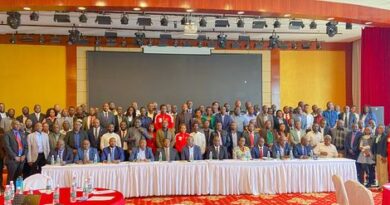Building Africa’s Digital Future: From Vision to Action with Private Sector Power
Africa’s digital transformation is accelerating, with growing investment, innovation, and expanding access. But infrastructure and investment gaps impede the scale and scope of progress.
Expanding the continent’s digital future requires urgent and coordinated action. These were the key priorities highlighted at the recent Global Africa Business Initiative (GABI) Bridge session in Abidjan, Côte d’Ivoire.
The message was clear: Africa doesn’t suffer from a lack of ideas. The challenge lies in accelerating digital growth, mobilizing investments, and ensuring policy coherence.
What will it take to build Africa’s digital future?
This was the central question posed by the GABI Bridge session in Abidjan, on the sidelines of the Africa CEO Forum.
Convened by the UN Global Compact, GABI aims to put Africa’s private sector at the center of global trade and investment. Bringing together an influential group of CEOs, Government officials, investors, and development leaders, the GABI session inspired an insightful dialogue about how to accelerate infrastructure, align policy, and mobilize long-term investment.
As James Manyika, Senior Vice President at Google–Alphabet noted at another recent GABI event: “Basic connectivity infrastructure is essential—that’s why we’ve invested in undersea cables connecting Africa to itself, Europe, and Asia. But beyond infrastructure, investors must also focus on skills and entrepreneurship. That’s why we launched the Black Founders Fund, which has supported over 1,120 African startups. Building a vibrant AI ecosystem depends on this. We also need more research happening in Africa—our research centres in Ghana and Kenya, and our university partnerships, are helping Africans build skills and create local innovation.”
James Manyika is right—the real challenge isn’t just identifying solutions, but executing them effectively, especially in skills development, talent cultivation, and entrepreneurship. Africa has made great strides in digital services and broadband, yet the real task now is scaling proven successes. Fintech, AI, and e-commerce are driving some of the world’s most innovative advances, with African fintech enabling faster, large-scale cash flows, and e-commerce sustaining the vital SME sector. Yet much of Africa still lacks the foundational infrastructure—challenges with last mile connectivity to the electricity grid and to fiber optic cables, and limited investments in data infrastructure—that these industries need to grow.
Africa’s tech sector is often shaped by short-term venture capital priorities, overlooking essential digital infrastructure. Long-term investment by governments and institutions is crucial to build an enabling environment. Digital progress, from data centres to public platforms, relies on investment and strong partnerships. Africa needs committed stakeholders to build a lasting digital economy.
The private sector is key to digital transformation, but lasting change demands collective action. Governments, investors, and development partners must align efforts and commit to long-term investment.
True progress comes from collaboration, commitment, and a shared vision for Africa’s future. As Sinazo Sibisi, Chief Investment Officer at the Timbuktoo Africa Innovation Foundation, reminded us at the GABI Bridge: “We need to move from talk to action—from finite projects to systemic change—and build an innovation architecture that drives competitiveness in the next 10 to 30 years.”
Leadership matters. So does skills development. We must invest in human capital with the same urgency as we do fibre optic cables. From curricula and teacher training to digital apprenticeships, the talent pipeline is crucial and demands immediate attention.
Additionally, governments must provide clear rules and stable conditions for digital transformation. This includes certainty around regulations, investment in digital infrastructure, and better coordination across borders so African startups can grow across the continent. If Africa’s digital transformation leaves behind the rural, the informal, or the marginalized, it will breed inequality rather than prosperity. A digital Africa means ensuring everyone can participate, which requires prioritising access to infrastructure, affordable services, and content that is relevant and meaningful. Accelerating Africa’s digital transformation will require stronger public-private partnerships and a more enabling policy environment. Although there are challenges, there are notable standout examples. Togo, Rwanda, and Kenya have made remarkable progress in digital governance, fintech and infrastructure. To sustain this momentum, the progress must be scaled and supported across Africa.
The message from GABI is clear: Africa’s digital future depends on effective delivery, which can only be achieved through the combination of the right policies, investments, and decisions made today by investors, policymakers, and the private sector.
Each year, in September, as world leaders gather for the opening of the UN General Assembly, GABI uses the moment to elevate Africa’s private sector agenda, highlighting investment opportunities, trade priorities and the continent’s economic potential through its flagship event, Unstoppable Africa. This year, Unstoppable Africa will take place on Sunday, 21 and Monday, 22 September at the New York Marriott Marquis under the theme “The BIG Push: Africa’s Time to Shape the Markets” and be co-convened by the UN Global Compact and the African Union.
Through the Global Africa Business Initiative and through the UN Global Compact’s Africa strategy we are forging this path.



